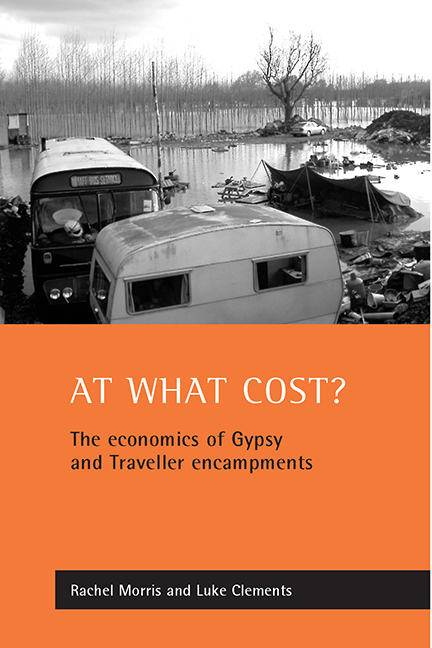Book contents
- Frontmatter
- Contents
- List of tables
- Preface
- Acknowledgements
- List of acronyms
- Dedication
- one Introduction
- two Past and present law
- three The costs to local authorities
- four The costs to others
- five Best Value
- six Rights, race relations and Best Value
- seven Conclusion: obstacles and opportunities
- References
- Appendices
- Index
- Also available from The Policy Press
two - Past and present law
Published online by Cambridge University Press: 20 January 2022
- Frontmatter
- Contents
- List of tables
- Preface
- Acknowledgements
- List of acronyms
- Dedication
- one Introduction
- two Past and present law
- three The costs to local authorities
- four The costs to others
- five Best Value
- six Rights, race relations and Best Value
- seven Conclusion: obstacles and opportunities
- References
- Appendices
- Index
- Also available from The Policy Press
Summary
Travelling People within the UK have never enjoyed a Golden Age. Although legal restrictions on the Travelling way of life have multiplied over the last hundred years, it is probable that prior legal and extra-legal restrictions were every bit as oppressive.
The enclosure of common land undoubtedly affected Travelling People no less than other landless people, as did the more recent decline in demand for manual labour due to farm mechanisation. Social change and legal regulation have inevitably marched together. Their combined impact has been to curtail the possibility of (and possibilities for) a nomadic way of life. Differences exist among legal commentators as to which statutes have proved to be the most oppressive in terms of tightening the restrictions faced by Travelling People. In reality, the screw has been turning steadily, at least since Gypsies first came to the UK five or six hundred years ago (Mayall, 1995).
As will be discussed, Mr Justice Sedley (now Lord Justice Sedley) considered the regulatory impact of the 1960 Caravan Sites and Control of Development Act to be a crucial marker, as other commentators to whom he referred had highlighted provisions within that Act restricting access to remaining common land. Yet others have emphasised the impact of the 1947 Town and Country Planning Act or the restrictions on highway camping contained in the 1959 Highways Act.
As ever, however, the story is more complex. Public regulation of the commons (including the prohibition of camping) dates back to at least the Commons Acts of the late 1800s and early 1900s, and the 1925 Law of Property Act. The control of development substantially predates the 1947 Act and highway use has always been the subject of robust policing.
In retrospect, it is possible to subdivide post-World War Two legislative history, as it has impacted on Travelling People, into three distinct phases. The first 25 years (until 1969) was a period that witnessed a vast growth in regulations, which (albeit incrementally) created enormous problems for Travelling People. In response to these problems, legislation was enacted that sought to remedy some of the difficulties. This, the second phase, can be characterised as the consensus years. The final (and present) phase has seen the rise of a new intolerance that views Gypsies and other Travellers as being the ‘problem’, rather than the problem being the social regulatory system that has effectively outlawed their way of life.
- Type
- Chapter
- Information
- At What Cost?The Economics of Gypsy and Traveller Encampments, pp. 11 - 28Publisher: Bristol University PressPrint publication year: 2002



